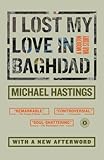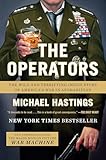
There was a certain buzz in the air before Michael Hastings’s The Last Magazine was published back in June of this year. His personal story, in fact, is the stuff that good fiction is made of. A prominent journalist, he died just over a year ago in a single-vehicle crash in the hours before dawn, triggering speculation that he had been murdered. He began his career at Newsweek, which was how I came to know him.
I worked far away from the glitz of the New York office, running the Middle East bureau of Newsweek in Jerusalem, researching, and eventually writing. I spent hours working on stories focusing on the Middle East conflict that seemed urgent, fresh, and original until they reached the svelte boardroom of the editors come Monday morning, where they were invariably shot down or changed beyond belief.
 I met many Newsweek writers as they passed through the bureau on their way to assignments in Iraq, Afghanistan, and other global hotspots. Photographers, journalists, editors — they all dropped by the bureau with their flak jackets, cameras, and sat phones. Mike Hastings was one of them, back then a reporter en route to Iraq for the first time. We had drinks one night in the bar of the American Colony, a favourite hangout of many foreign journalists. I liked Mike, sensing that underneath the bluster of war correspondent was a genuinely nice guy, jittery about his professional abilities but incredibly ambitious, wondering when he should propose to his girlfriend and whether he should encourage her to follow him to Iraq. He did propose, she did follow him, and a short time later she was killed when her convoy was attacked by Iraqi militants, as documented in Hastings’s autobiographical work, I Lost My Love in Baghdad: A Modern War Story.
I met many Newsweek writers as they passed through the bureau on their way to assignments in Iraq, Afghanistan, and other global hotspots. Photographers, journalists, editors — they all dropped by the bureau with their flak jackets, cameras, and sat phones. Mike Hastings was one of them, back then a reporter en route to Iraq for the first time. We had drinks one night in the bar of the American Colony, a favourite hangout of many foreign journalists. I liked Mike, sensing that underneath the bluster of war correspondent was a genuinely nice guy, jittery about his professional abilities but incredibly ambitious, wondering when he should propose to his girlfriend and whether he should encourage her to follow him to Iraq. He did propose, she did follow him, and a short time later she was killed when her convoy was attacked by Iraqi militants, as documented in Hastings’s autobiographical work, I Lost My Love in Baghdad: A Modern War Story.
Around the time of his death, he had just published “Why the Democrats Love to Spy on Americans,” an aggressive indictment of the Obama administration. According to reports, he emailed colleagues that he was now “onto a big story” and needed to go “off radar” for a while. Some say he was being tailed by the FBI.
 Hastings was just 33 when he died, but had already made his mark in the world of mass communication. After cutting his journalist teeth on Newsweek, beginning as an unpaid intern, he went on to write for Rolling Stone
Hastings was just 33 when he died, but had already made his mark in the world of mass communication. After cutting his journalist teeth on Newsweek, beginning as an unpaid intern, he went on to write for Rolling Stone
The Last Magazine is a breezy, gonzo-style roman a clef and a thinly-veiled description of the teetering, fast-changing world of journalism. It focuses on the majestic failure of Newsweek, once as permanent a fixture in American culture as apple pie, baseball, and fireworks on the Fourth of July.
I’ll bet there isn’t an American journalist walking this earth who didn’t rush to read the scoop when The Last Magazine was published. I know I did, with a greedy interest to look in the mirror at myself and the people I worked with in foreign journalism for more than a decade. But it’s also a novel that will appeal to anyone interested in why print journalism has taken such a fall.
The novel centers on a fledgling writer (not surprisingly called Michael M. Hastings) — raised on the Holocaust, Hunter S. Thompson, and Mountain Dew — who spends much of his time closeted in a cubicle fact-checking other people’s stories like those before him.
Against the events of the War in Iraq, we are introduced to the coke-sniffing A.E. Peoria, star foreign correspondent. He becomes a pawn in the hands of the suited executives back in New York and crashes into oblivion, all under the watchful eyes of the young Hastings, who befriends him in order to learn what makes Peoria tick.
Hastings the novelist throws punches mercilessly; no one is spared his biting sarcasm. The weekly’s spectacular nosedive is blamed largely on “corporate betrayal,” as Michael Hastings hints at the beginning of the novel. The Last Magazine exposes what was really happening behind the glossy, failing magazine and the characters that powered it into arguable oblivion. Those in the know will recognize the players milling around the corridors of Newsweek’s fluorescent-lit New York office, such as Nishant Patel (Fareed Zakaria) and Sanders Berman (Jon Meacham), two media executives involved in a power struggle. Hastings portrays them as more intent on appearing on TV and furthering their own careers than acknowledging the digital revolution that threatens to engulf old-school print journalism. The clash between these two worlds is clearly portrayed in a conversation between the protagonist and Mr. Grove (Nick Denton), who heads wretched.com (standing in for the gossip media website Gawker):
“What’s the readership of your dead tree?” Grove asks.
“I think they say it’s like twenty million readership, three million circulation,” I say.
“Twenty million, my arse. Three million copies for the doctor’s office and dentist rooms, a whole forest chopped up for stale news, innit?”
“We definitely use a lot of paper,” I say.
Some parts of the book had me howling with laughter. “This is fiction, it’s all made up,” Hastings writes in the introduction, yet how well I recognize the scenes he portrays, such as the editors’ meeting in which global stories are pitched and headlines are created: “All the headlines on the covers either contain the word “new” (“The New Happiness,” “The New War on Drugs,” “The New Normal,” “The New Hollywood,” “The New Aging,” “The New Parent Trap,”) or end in a questions mark (“Did the President Lie?” “The Candidate to Beat?” “Is the Globe Warming?”) — and sometimes have both (“The New Mystery of Mary Magdalene: Can Science Tell Us What History Can’t?”)
There is also an amazingly accurate and hilarious snapshot of a book launch party that reveals how magazine journalism really works: “I’m looking over the room, and I notice that most of the people look more or less like they’re up here for a reason — because they’re supposed to be — or are here because they’re the kind of name that goes in a New York gossip column, which is great for Sanders Berman’s book…”
We will never know when Michael Hastings was intending to publish The Last Magazine. The manuscript was discovered by his wife sometime after his death; I suspect Hastings would have opted to rework some of the material lurking on his laptop before publishing. This, ironically, is also one of the strong points of The Last Magazine: its rawness, open-eyed youthfulness, and almost lovable stream of meta-commentary consciousness. “What gave me the right, at twenty-four or twenty-five, to expect my goals and desires to be taken seriously at The Magazine? Why did I expect them to care or to give a shit? Let’s get my head out of my ass here: this is a magazine, part of a company that routinely hires and fires and thwarts much bigger plans than mine.”
A couple of weeks before he died, Mike Hastings emailed me. “Hi Joanna,” he wrote. “It’s been waaaay too long!” He wanted to know if I could help with information on Israelis in senior security positions who may have had connections with CIA director John Brennan, who was in Jerusalem at the time. It was for a profile that Hastings was intending to write. It would have been controversial, no doubt, and I am sure Mike Hastings was putting his everything into researching it. We emailed briefly. He said he would be in touch. That was the last time I ever heard from him.









